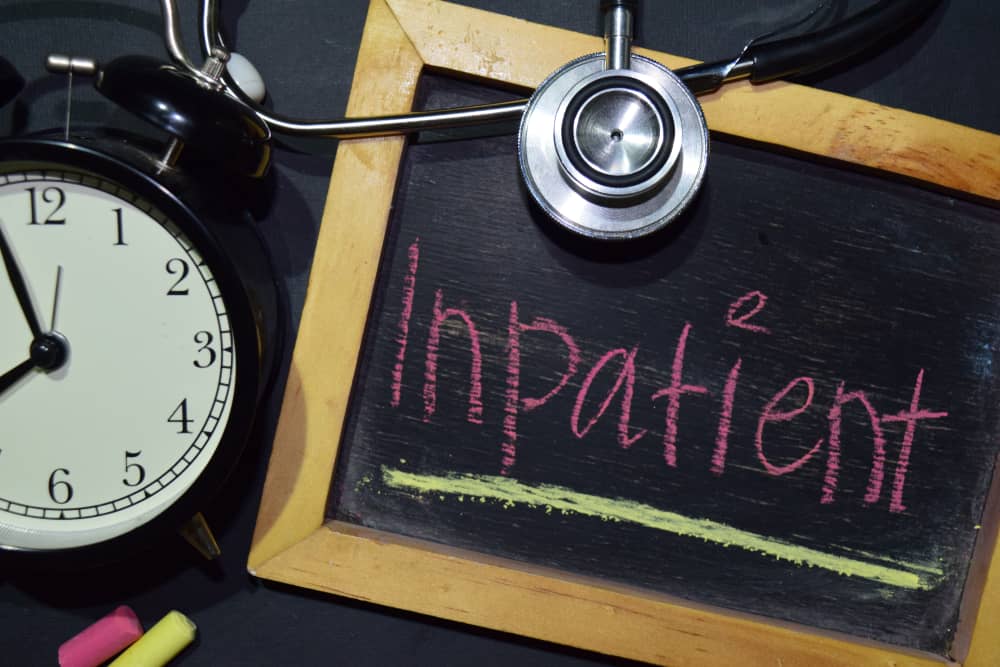Northbound Treatment has been helping individuals overcome addiction and substance abuse disorders for over three decades. We offer a variety of programs at our treatment centers in the coastal region of Orange County in Southern California, including inpatient treatment.
If you’re exploring addiction treatment options for yourself or a loved one, you might be wondering, What is inpatient treatment? Here at Northbound, we want our clients and their families to feel good about the treatment plan they select and have a thorough understanding of how it works. Keep reading to find out more about inpatient treatment at our rehabilitation center, where it fits in the continuum of care, and why it’s a critical part of recovery.
What Is Inpatient Rehab & How Does It Work?
Inpatient treatment, inpatient rehab, and residential rehab are interchangeable terms. But what is inpatient rehab, exactly? Essentially, this type of drug and alcohol rehabilitation program involves living at a treatment center for at least 28 days. The length of stay varies depending on the nature of a patient’s addiction, as well as their health condition and goals. Some clients stay for as long as six months.
In this safe and secure environment, clients participate in an intensive treatment plan and have around-the-clock access to medical care and psychological support. They work with their providers to come up with a treatment plan that takes into account their current needs, health history, objectives, and preferences.
Each client has a daily schedule, in which they meet with therapists for one-on-one counseling and group sessions. This routine helps you relearn how to be responsible and accountable while respecting the time and efforts of others. Additionally, the closed setting is beneficial for many struggling with drug and alcohol addiction, as temptations and distractions at home can be overwhelming at the beginning stages of addiction recovery.
To learn how to have someone committed for drug abuse, read our blog post for all the information you need to know.
Residential Rehab: What to Expect
For the length of your stay in residential rehab, the majority of your time will be spent on a comprehensive treatment program. Aside from individual counseling and group therapy, you’ll participate in exercises and activities designed to heal the mind, body, and soul, including experiential therapy and other evidence-based approaches. This may involve art workshops, outdoor recreation, accelerated resolution therapy (ART), or eye movement desensitization and reprocessing (EMDR).
Without the distractions, stress, triggers, and negative influences of everyday life, the urge to return to alcohol or drug abuse is usually reduced. This allows clients to focus on sobriety and build essential life skills.
Though some people may be nervous about the idea of a closed treatment setting, the residential rehab programs at Northbound are emotionally supportive and comfortable. Some inpatient programs include a family therapy component in which family members can participate in the addiction recovery journey. During your time at inpatient rehab, you’ll also benefit from having a close-knit community of sober peers to interact with daily. This camaraderie and empathy can be immensely helpful for those in recovery.
No two paths to sobriety are the same. Since rehab treatment plans are determined on an individual basis, your experience in inpatient treatment will look different than the next person’s. During your initial assessment, you’ll collaborate with a clinical team to develop a plan that suits you best.
The Full Continuum of Care
Inpatient treatment is part of the full continuum of care offered by Northbound. In most instances, clients begin residential rehab after completing detox. Following an inpatient program, many transition to outpatient treatment, and then addiction support services. Here’s what you should know about each step.
Detox
For many suffering from drug addiction or alcoholism, detox (short for detoxification) is a vital first step. This is when the body rids itself of toxic substances and healing begins. Individuals typically experience a range of uncomfortable withdrawal symptoms, which can last between three to seven days — or longer in some cases. Although some people want to attempt to go through it at home, we strongly suggest a licensed and accredited detox program that provides a safe, secure, and clinically supervised environment.
Residential Rehab
As we mentioned, patients usually start inpatient rehab after safely detoxing from drugs or alcohol. Residential treatment isn’t the be-all and end-all, but an intensive program in a focused setting prepares patients for the next stages and helps pave the way for life-long sobriety.
Outpatient Treatment
You may be wondering: what is outpatient rehab? Unlike residential rehabilitation, clients live at home while participating in outpatient treatment programs. In many instances, intensive outpatient (IOP) treatment follows inpatient rehab. With an IOP program, you would spend up to 12 hours a week at a treatment center. After that, some patients transition to outpatient treatment, which is less intensive and requires up to six hours of weekly participation. Northbound Treatment is also proud to offer telehealth outpatient services that cater to the needs of our clients as they adjust to sobriety at home.
Addiction Support Services
Recovery is a life-long journey, and many individuals benefit from ongoing support after completing an outpatient program. With Northbound Treatment’s addiction support services, you’ll get continuing guidance and motivation as you adjust to a sober lifestyle and develop independence. While being held accountable for maintaining sobriety, you’ll have the tools you need to get back to your family, career, and community.
To learn more about “what is sober living?” as a part of ongoing addiction support, visit our blog post and we’ll tell you more about the subject.
Why Inpatient Rehab is Crucial
Inpatient rehab is an effective and often crucial component of recovery. When it comes to preventing relapse, the first few months are critical. While living at home can be comforting during this pressing time, the chance of relapse is also higher. The structured setting allows clients to focus on sobriety and overcome their addictions without distractions.
Some patients enter residential rehab as soon as they complete detox, while others opt for an inpatient program when outpatient treatment is unsuccessful. In mild cases, outpatient rehab can be sufficient after detox, but many get the most benefit from inpatient treatment as a stepping stone between the two. It’s easier to stay on track with a dedicated schedule, the care of clinical staff, and the solidarity of sober peers.
Is Inpatient Treatment Right for You?
If you’re on the fence about inpatient rehab, we encourage you to consider the various factors that will play a role in your recovery. Inpatient treatment is the right solution if your home environment could trigger you to relapse. Even with a support system of family and close friends, day-to-day temptations could interfere with your sobriety.
For those with chemical dependence, a closed environment is ideal during the first couple of months. Also, if you’ve been unsuccessful at quitting drugs or drinking in the past, a residential rehab program is your best bet.
Some people don’t want to interrupt their job or schooling, but the reality is that these obligations can increase stress and distract from your recovery. Northbound Treatment offers Careerbound® and Collegebound® programs that help clients stay on track with their careers and education. We want you to succeed, and we’re here to support both your sobriety and long-term goals.
Residential Rehab Programs at Northbound
When you enter into a residential rehab program at Northbound Treatment, you’ll have a comforting, effective daily regimen. Ultimately, you’ll learn about the root causes of your addiction, develop the necessary tools to cope, and begin the healing process. Our InVivo® rehabilitation model empowers clients to confidently reenter the outside world, with all of its unpredictability. Additionally, we offer gender-responsive programs that account for the ways in which men and women are impacted by drug abuse.
Many clients at Northbound receive dual diagnosis treatment as part of their recovery plan. This means they’re treated for a co-occurring mental health condition, such as an eating disorder, anxiety, depression, bipolar disorder, OCD (obsessive-compulsive disorder), trauma, or codependency. We find this integrated approach to recovery to be more effective for healing than addressing addiction and mental health separately.
Northbound is committed to transforming lives, and we’re good at what we do. Whether you’re struggling with alcoholism, drug addiction, or substance abuse disorder, we welcome you to join us at one of our Orange County treatment centers. From medical detox and inpatient rehab to outpatient treatment and aftercare services, we’re here for you every step of the way.
Start Today
If you’re concerned about the cost of rehab treatment, Northbound can help with that, too. Not only do we accept almost all major insurance plans, but we’re also an in-network provider. When you get in touch with our team of insurance specialists, we’ll review your health benefits, verify coverage, and let you know what your options are for treatment. If inpatient rehab requires precertification, we can assist with that process as well.
For questions or concerns about inpatient treatment that weren’t answered here, please contact us at Northbound today. The best time to begin rehab is the present, and we’d love for you to join us. Give us a call to start the road to recovery.
Sources:
- Gifford, Steven, LICDC, and LPC. “Differences between Outpatient and Inpatient Treatment Programs.” Psychcentral.com. N.p., 17 May 2016., https://psychcentral.com/lib/differences-between-outpatient-and-inpatient-treatment-programs/
- “Types of Treatment Programs | National Institute on Drug Abuse.” Drugabuse.gov. N.p., n.d., https://www.drugabuse.gov/publications/principles-drug-addiction-treatment-research-based-guide-third-edition/drug-addiction-treatment-in-united-states/types-treatment-programs
- “Treatment Settings | National Institute on Drug Abuse.” Drugabuse.gov. N.p., n.d., https://www.drugabuse.gov/publications/principles-adolescent-substance-use-disorder-treatment-research-based-guide/treatment-settings










